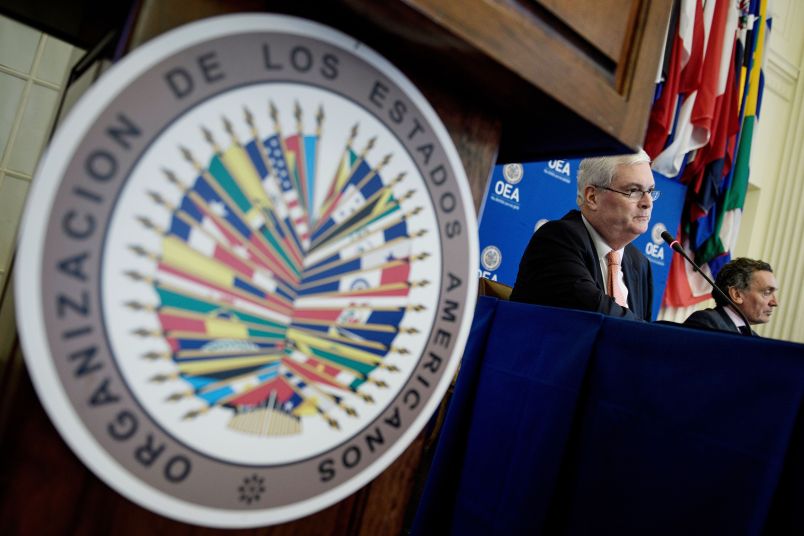As federal courts across the United States wrestle with the constitutionality of President Trump’s mass-separation of immigrant parents and children, some immigrant advocacy groups are turning to international legal bodies to force the Trump administration to disclose its plans for reuniting the families, carry them out as soon as possible, and cease from separating any more families going forward.
Several legal and civil rights groups have filed an Emergency Request for Precautionary Measures at the Inter-American Commission on Human Rights — part of the Organization of American States (OAS) — on behalf of a group of immigrant parents whose children were taken from them. On June 22, the commission demanded the U.S. government disclose the location and physical and emotional status of the parents and the children, updates on the reunification process, and the justification for separating the children from their parents in the first place.
Neither the Trump administration nor the commission would confirm to TPM whether the government met the June 27 deadline for turning over that information. Generally, the Commission makes the government’s report public a few days after receiving it.
The IACHR can refer cases to the Inter-American Court — based in Costa Rica — but both bodies lack an enforcement mechanism. Generally, civil and human rights groups turn to the commission to shine a light on government actions and whip up public pressure. Because the U.S. never ratified the American Convention on Human Rights, the document that created the two bodies, it is not subject to their jurisdiction.
In light of the Trump administration’s expressed hostility to international governmental organizations — demonstrated by the recent withdrawal from the United Nations’ human rights council — the groups that submitted the petition are worried the Trump administration will ignore or defy the commission in this case.
“The U.S. is a founding signatory of the OAS charter,” Efrén Olivares with the Texas Civil Rights Project told reporters on a conference call this week. “These are binding rulings by international human rights bodies, and the U.S. has historically complied with those rulings, for the most part. If the U.S. does not comply with the ruling, it will be an affront to international human rights law. It will join the ranks of Cuba and Venezuela in that respect.”
Since the petition was originally submitted at the end of May, the group says, things have gotten worse for their clients — despite President Trump’s executive order purporting to put an end to the family separation policy and despite a federal court ruling Tuesday that the government must reunite all separated families within 30 days.
In a report filed with the IACHR on Wednesday, the Texas Civil Rights Project says they’ve confirmed that at least five parents have been deported without their children, who remain in the custody of the Department of Health and Human Services. They are attempting to determine whether five other parents who have been deported were returned to their home countries with or without their children. At least two children have been deported without the parent from whom they were separated.
Additionally, the group claims, some parents in ICE custody are being charged money for the phone calls they must make to a hotline set up by the U.S. government to determine the location of their children. For those able to purchase phone credits, many barriers still remain:
“When parents have tried to call these hotlines to locate their children, wait times sometimes exceed an hour, parents are unable to get through or only hear busy signals, the call disconnects, and that, once a parent is able to speak with an operator, all he or she can do is provide information. The hotline personnel then must independently verify the information and family relationship and call back. Detained parents cannot receive phone calls and often have difficulties, due to limited phone access, in remaining on hold for long periods of time.”
When attorneys for the parents attempted to call the hotline on June 26, the report adds, “the government representatives Petitioners spoke with often deliberately hung up on Petitioners upon Petitioners disclosing that they were calling to inquire about the location of a parent separated from a child at the border.”
Because the government cannot legally hold children in immigration detention for more than 20 days, and because the Trump administration is refusing to let most families out of detention until their immigration court hearings, the government has yet to reunite most of the thousands of separated parents and children.
“The government appears to limit reunification to parents who have been or will be ordered removed,” the report says. “At least two parents have been told by government agents that the way for them to be reunited with their children is for them to sign a ‘voluntary’ return.”
Olivares told reporters earlier this week that they are calling on the international commission to put a stop to this practice.
“You being reunified with your child should not depend on you signing up for voluntary departure. Those should be two totally separate decisions,” he said. “So this is by definition not voluntary. This is obtained under duress, and I would say it’s coerced.”







Remember when Obama went on that whole Please Forgive Us for Bush tour? Well we’re gonna need about three Obamas when this is all over.
“You being reunified with your child should not depend on you signing up for voluntary departure."
Bravo to the international community for stating this so clearly.
This is why the US recently withdrew from the UN Human Rights Commission. This administration does not believe in human rights. Therefore, any claims that the US is violating basic human rights of immigrants is fake news.
The article attributes that quote to Efrén Olivares with the Texas Civil Rights Project.
Thanks for providing that clarification. (I read too quickly and attributed the quote to an international spokesman.)